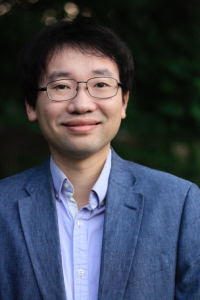Shihong Lin wins prestigious Paul L. Busch Award for innovative water research
Published on by Water Network Research, Official research team of The Water Network in Academic
Shihong Lin (Vanderbilt University)
Shihong Lin, assistant professor of civil and environmental engineering at Vanderbilt University, has won the 2020 Paul L. Busch Award from The Water Research Foundation for his leadership in developing innovative water separation techniques. Since 2001, the award has provided more than $1.9 million in funding to up-and-coming researchers who are making major breakthroughs in the water quality industry.
“I am honored and humbled to receive the 2020 Paul L. Busch Award, joining a cohort I have looked up to as role models throughout my career,” said Lin, who also holds a secondary appointment in chemical and biomolecular engineering. “Separation processes have always been critical to water and wastewater engineering, and I have been fortunate to work in this exciting field. I hope that advances in this new frontier of precise solute-solute separation will enhance our ability to engineer water quality and enable fit-for-purpose water and wastewater treatments that are more cost-effective, adaptable and sustainable, as the need for solutions to address water scarcity grow in urgency.”
According to a release, Lin intends to apply the $100,000 award toward achieving fit-for-purpose water treatment via selective ion and molecular separation processes using electro-regulated nanofiltration (e-NF). These advanced separation processes can help water utilities desalinate seawater and brackish water, purify contaminated groundwater, and reuse municipal and industrial wastewater. The processes also assist in the recovery of resources, such as nutrients from wastewater and valuable minerals from industrial wastewater.
Growing up in Foshan, a city in southern China where water pollution was a major problem throughout his childhood, Lin chose to study environmental engineering at the Harbin Institute of Technology and pursue his master’s and doctorate at Duke University. During his postdoctoral work studying the water-energy nexus at Yale University, he developed the world’s first “omniphobic” (i.e., liquid-repelling) membrane for membrane distillation.
Joining the faculty of Vanderbilt’s School of Engineering in 2015, Lin has been directing a research group focused on advancing water separation technology through membrane-based, electrochemical and hybrid processes. The main research goals of his lab are to enhance the research community’s fundamental understanding of various water separation technologies, from molecular to system levels, and to develop new processes and materials that lead to higher process efficiency, reliability and versatility.
He previously has won notable awards such as the American Chemical Society’s Environmental Chemistry Graduate Student Award and Petroleum Research Foundation Doctoral New Investigator Award, the Ralph Powe Junior Faculty Enhancement Award from the Oak Ridge Associated Universities, and the Young Investigator Award from the Association of Chinese-American Professors in Environmental Engineering and Science. Lin is currently the associate editor of two Elsevier journals, Journal of Water Process Engineering and Chemical Engineering Journal Advances .
Lin will discuss his latest research in a webcast on Oct. 29 at 3:00 p.m. EDT. Registration is required.
The Water Research Foundation is a nonprofit, educational organization that funds, manages, and publishes research on the technology, operation and management of drinking water, wastewater, reuse, and stormwater systems—all in pursuit of protection of public health and the environment. WRF represents approximately 1,200 subscribers, hosts an online research library of more than 2,300 completed projects valued at $700 million, manages an innovation platform (LIFT Link) with a database of more than 140 innovative technologies, and supports the world’s largest body of stormwater best-practice data.
by Marissa Shapiro Oct. 1, 2020, 10:00 AM
Attached link
http://www.youtube.com/embed/bQ-zBGKIhX4Taxonomy
- Filtration
- Nano Devices
- Water filtration, purifiers, nano filtration
